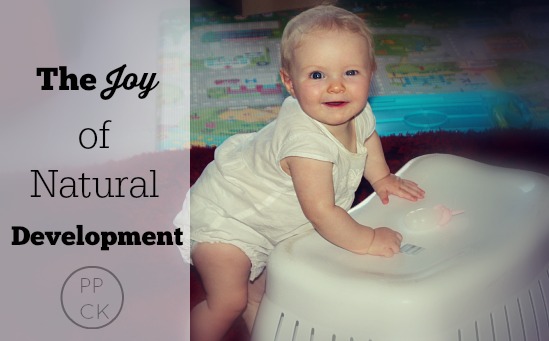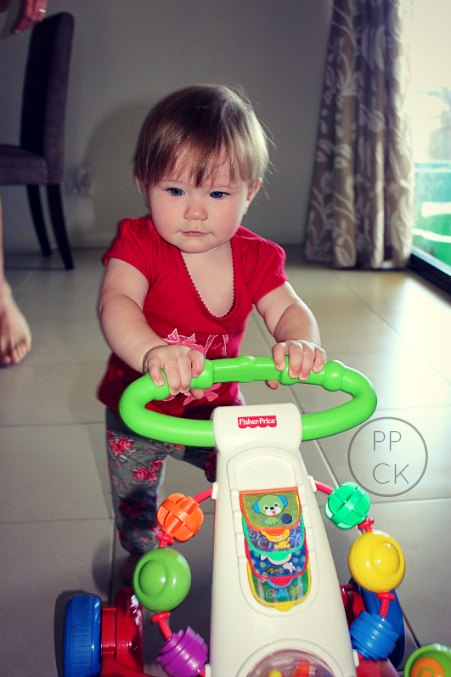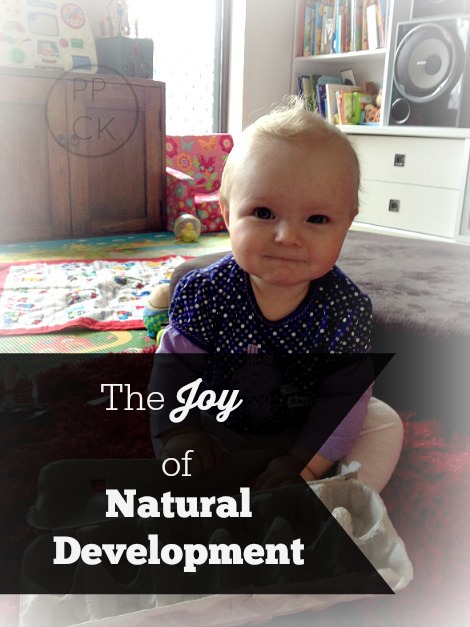Watching your child achieve their milestones in those early years must be one of life’s greatest pleasures. Each one gets carefully recorded and cameras are always on hand to capture those priceless moments when your baby first smiles, rolls, sits, laughs, crawls, walks and so the list goes on. As they occur, a parent can then also breathe a sigh of relief that their child is indeed on track.

For many parents, though, that desire for their child to accomplish these milestones is so great that they take measures to assist and guide them through the process of achieving them. This may not seem a big deal but in doing this parents unwittingly restrict valuable opportunities for learning countless other skills along the way. What’s more, it also sends a message to the little ones that what they CAN do is not good enough; they need to do more.
I used to be one of these parents. I did not trust in my daughter’s capabilities to learn things for herself, nor could I curb my impatience for her to achieve milestones so I could show her off and revel in her achievement. Since studying and implementing Magda Gerber’s RIE approach I have made adjustments to my thinking about a child’s development and can now attest to the enormous benefits of restraining from assisting and instead, allowing natural development for my second daughter.
With my first child I did all the ‘normal’ parenting tricks thinking it was perfectly fine and in fact helpful for my child to be aided with props or myself. I used cushions to help her sit, I put her in a bouncer, a jolly jumper and a swing, each time delighting in the huge smiles she would give in return.
When she was showing small signs of wanting to crawl or stand, I was on hand to give her a push in the right direction. She was a fast learner and was standing at furniture at 7 months, crawling at 8 months and walking at 10.5 months.
Of course her first experience of walking was by me holding her hands above her head whilst she awkwardly stumbled forwards. This was followed soon after with pushing a walker around the house.
But in all the assistance I was providing her, I was denying her of the chance to develop these skills herself. I was taking away that opportunity for her to own her achievement and be proud of it. She would not slowly become aware of her body and its abilities like she should have been allowed to. Rather, she developed a false sense of security in her ability and when the time came for her to try things out independently, she often had accidents and mishaps.

Soon after my second child was born, I was introduced to RIE. I learned that children did not need to be shown how to do anything. Children are capable beings who have natural instincts to achieve milestones in their own time. I learned my daughter would roll when she had naturally developed the muscles and neurons to enable it, she would sit when she felt she could do so safely and she would walk when she was ready.
And she is now totally content with her capabilities. She does not cry out quickly in frustration when she is not able to do something. I have never expected more of her than she is capable of doing and as such she has developed patience and contentment in her own body.
A pleasant side to this style of parenting has to be the sheer joy I now find as I watch my baby connect the dots. I have delighted in her determination to stand without any assistance or guidance and never once have I been concerned that she will fall after she has pulled herself up. I know that not only is her mind ready to make the step up but her body too has been given the right amount of time to strengthen the appropriate stabilising muscles and neuron connections to keep her safe.
One of the funniest reassurances of this method came not so long ago when my baby was about 10 months old. I had made the decision, in line with this natural development style, that I would not give her a walker to push to practice her walking. I knew she didn’t need one and I knew that when the time came she would be ready to walk. I had to laugh though, when one evening, I was standing on one side of the kitchen bench when the highchair suddenly started moving across the floor.
When it had moved about 5 metres I could see my baby walking along pushing the chair in front of her. She was obviously ready to start practising and she now pushes any object she can get enough muscle behind to move.
When the time comes for her to take her first unaided steps, I will once again watch in amazement at the sheer brilliance of my child who has mastered one of life’s most fundamental skills without coaching, steering, guiding or pushing, but rather, all on her own. Until then, I am happy to watch her contentedly move around the house by other means, blissfully unaware that she should need to do anything else!
You might also enjoy reading:
Allowing Children to Play for Their Age and Stage ~ Kate Russell (Peaceful Parents, Confident Kids)
Don’t Stand Me up ~ Janet Lansbury (Janet Lansbury- Elevating Childcare)
Sitting Baby Up: The Downside ~ Janet Lansbury (Janet Lansbury- Elevating Childcare)
9 Reasons Not to Walk babies ~ Janet Lansbury (Janet Lansbury- Elevating Childcare)
Baby on the Move: What Infants Can do When We Let Them ~ Kelly Meier (Respectful Parent)
For more information about RIE parenting I’d highly recommend reading the following books (affiliate links):
Dear Parent: Caring for Infants With Respect (2nd Edition) ~ Magda Gerber
Your Self-Confident Baby: How to Encourage Your Child’s Natural Abilities — From the Very Start
~ Magda Gerber
Elevating Child Care: A Guide to Respectful Parenting ~ Janet Lansbury
No Bad Kids: Toddler Discipline Without Shame ~ Janet Lansbury


Pingback: Rebuilding a child’s confidence | Peaceful Parents, Confident Kids Blog
Pingback: Learning to be a Respectful Parent | Peaceful Parents, Confident Kids
Pingback: A Respectful Parenting Resource | Peaceful Parents, Confident Kids
Pingback: Learning to Swim: Taking a Child's Lead
Pingback: Toilet Training Regression: Supporting a Child's Toilet Learning Journey
Pingback: When Kids Take Risks (And Adults are Inwardly Freaking)
Pingback: 8 Reasons to Look Forward to a Third Baby